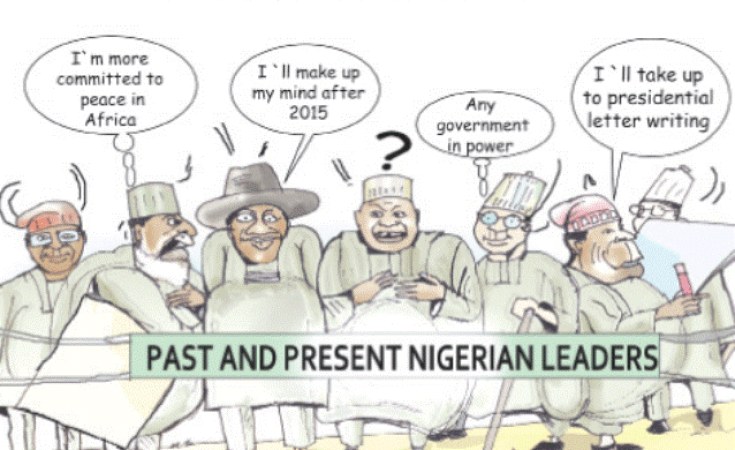In February 2015, Nigeria will be holding elections to choose both national and state-level leaders for executive and legislative arms of government. Though the polls are still five months away, Nigerians have cogent reasons for several election-related concerns.
These include:
- The preparedness of the election management body, the Independent National Electoral Commission (INEC);
- The apparent disregard of campaigning rules by non-party campaign groups supporting President Goodluck Jonathan, and INEC's inability to rein them in;
- Unguarded utterances by political heavyweights from both sides of the aisle;
- Intra-party and inter-party rancour; and
- The lingering security challenges, as typified by the Boko Haram insurgency challenge, mainly in the north-eastern geo-political zone of the country.
The prospects of a number of these challenges being significantly curtailed or dealt with before the elections are uncertain. What is certain is that Nigerians want elections that will be peacefully organised and significantly free and fair.
The last two gubernatorial elections held in Osun and Ekiti, which were generally regarded as peaceful, transparent and fair, show that Nigeria can organise elections without any major hitches. However, significant numbers of security operatives were deployed in these two states, something that cannot easily be replicated in the forthcoming national elections given the immense size of the country in relation to that of the security forces.
There are several other pertinent security challenges. For example, how will INEC conduct elections in the volatile states of the north-east? The answer is largely unclear, especially as there are no timelines on when possible threats may end, and the three core north-eastern states, Adamawa, Borno and Yobe, are still under legislative-backed emergency rule.
Moreover, there are also numerous allegations of human rights violations and extra-judicial killings levelled against government forces in the region, in response to which the government has provided no answers, preferring to treat them as malicious and unfounded.
It is important to note too that hundreds of thousands of people have been displaced over the years by insurgencies and many have relocated to new abodes where they are unlikely to be registered to vote. INEC plans to document eligible voters among internally displaced persons in camps in different parts of the country. But it is not certain how this and the additional plan for them both to participate in the general election and for their votes to be transferred to their original states will work.
In other states where gubernatorial elections will take place in 2015, intra-state tensions are mounting as power-brokers decide which zone should produce the next governor, especially where the sitting governors have completed their maximum terms of eight years in office. Enugu, Lagos, Plateau, Rivers, Akwa-Ibom, Delta and Cross-Rivers are all states where sitting governors are coming to the end of their terms. And aggrieved groups in some of these states want the outcomes of state-level party primaries for the selection of gubernatorial candidates to be skewed in their favour.
Contestation along party lines cannot be lost in the dynamics of the discourse on state-level politics and the 2015 elections. The dominant party in Nigeria, the People's Democratic Party (PDP), is determined to achieve victory in all gubernatorial polls scheduled for next year. It is, however, yet to be seen whether they will succeed in this quest, especially in the south-west, which is still largely in the reins of the All Progressives Congress (APC).
A pertinent point is that the nature of state politics heightens tension and can pose significant challenges to the election process. The selfishness of politicians, parochial considerations and money politics are some of the factors that undermine the integrity of inter-party politics and the relationships between political parties.
Election management is core to the success of the 2015 general elections. INEC needs to be well-positioned in terms of readiness, personnel capacity and funding so it can better perform its duties with credibility. The challenges of the last general elections must be avoided and all pre-election processes properly completed. It is critical to prioritise the effective distribution of Permanent Voters Cards (PVCs) to extend the opportunity to vote to all Nigerians who were previously too young to vote or missed out in the last registration exercise.
Politicians, especially the high-ranking and most influential ones, need to display more responsibility and refrain from utterances and speeches that may elicit volatile and violent reactions which threaten the outcomes of the elections. Religious and traditional platforms must be effectively utilised to mobilise Nigerians to avoid acts inimical to peace and security.
In the same vein, the media and the various new forms of citizen journalism active on social media must engage constructively on the elections and provide the public with informed, objective and unbiased reporting that advances their grasp of the issues at hand.
Nigeria's security arrangements must be better organised and the various arms of the security services must raise their game to show greater regard for human rights and to give effective protection to lives and property.
Citizen-based organisations and their civil society organisation partners should continually seek innovative and cost-effective ways to expand citizens' opportunities to engage in the electoral processes. Voter education and knowledge expansion programmes, which enable citizens to make the right connections between governance deficits and the choice of leaders, should be prioritized by civil society organisations.
It is certainly possible for Nigeria's 2015 general elections to be conducted without any major incidents, and they could indeed set a new benchmark in the country's conduct of elections, especially since the Presidency is saying that free and fair polls are a priority. We must however remain alert to the shenanigans that regularly pop up in the run-up to elections.
Amenaghawon Joseph Idahosa is Programme Coordinator for Economic Governance for the Open Society Initiative for West Africa.


